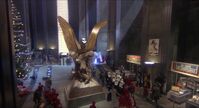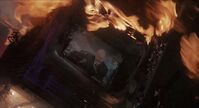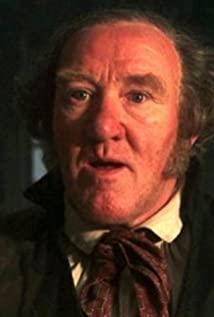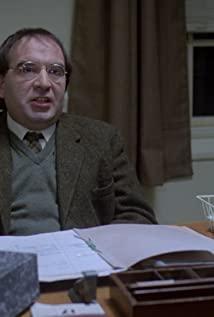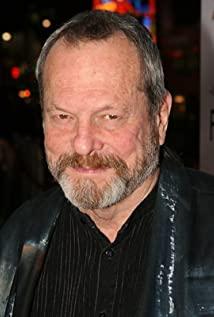"Brazil" is a "futuristic" "Orwellian" film. It presents an "Orwellian" theme with "futuristic" image elements.
Among the many reviews of Brazil, "futurism" is one of the most frequently used words. Perhaps, the metaphors and satire of the future in "Brazil" are easily reminiscent of this concept. "Futurism" is a hymn to the industrial and technological revolution, and "Brazil" sings the antithesis of "futurism". It heralds the alienation and restraint of human beings in the future technological life. Since "Brazil", there have been similar anti-futuristic films such as the famous "Matrix" series, "V-Force", "Blade Runner", etc. It is better to say that these films are "futuristic" Said to be "futuristic", they all imagine the future and emphasize the atavism of human beings. There is no doubt that "Brazil" is an "Orwellian" film against Nazi centralism and bureaucracy. In the country and era shaped by the film, people are forced to conform and are strictly regulated.
Like director Terry Gilliam's consistent work style, "Brazil" condenses the exploration of "time". To borrow a line from Gilliam's Twelve Monkeys, "The future is history." The sets in "Brazil" break down the temporal barrier. Although the film's hint suggests that the story is set in the future, Sam's life is fully automated, with a central information system handling the various needs of citizens across the country. But Sam's attire is still American 1940s, and at a dinner Sam attended, some people even wore medieval clothes. This kind of retro-style art is also found in the similarly styled Blade Runner. This can not only be interpreted as an echo of the novel "1984", but the gray and repressed emotions in the American noir film tradition also affect the audience because of the retro design of "Brazil". The only bright colors in the film are Sam's dreams and love for Jill.
The film begins with a TV commercial promoting the pipe, and the explosion of a Christmas tree in a street window immediately ignites the film's hot spot. This is a terrorist attack against the consumer society and the control of people. The film was then cut to television, but this time it featured the minister talking about terrorist attacks, ranging from commercials about consumption to talk shows about politics. Money and power form the roots of the film's "dystopian" society. But it did so through one of the most powerful mediums of the 20th century: television. Regarding TV commercials, Neil Postman said: "TV commercials are the strangest and most ubiquitous form of communication that people have had since they used TV... TV commercials have profoundly affected the American way of thinking. Of course, we It is not difficult to prove that it has also become a model for various structures of public discourse, but my purpose here is to demonstrate how it destroys political discourse." The medium of television metaphor has completely restricted human freedom. Exactly what Postman calls "entertainment to death." Terry Gilliam took the time to insert a joke in the film. A little girl around 5 years old asked her mother for a Christmas present, which turned out to be her own credit card. The inhumane significance of the terrorist attack is immediately dispelled in the subsequent scenes, which use the television as the editing point. The scene in which the government clerk slays the flies is accompanied by a speech from the defense minister, highlighting the minister's hypocrisy and cadavers. The scene is then cut to Bartle's house. It is certainly ironic that Mrs. Battle's fairy tales to children include the phrase "he's a miser" that constitutes the voice-over of the minister's image on the screen. However, the intrusion of the anti-terrorist forces at this moment broke the tranquility of this Christmas Eve. The setup echoes the previous terrorist bombing of the Christmas tree cabinet. This is a metaphor that the US government is actually the biggest terrorist. The government troops in "Brazil" are all dressed in Nazi SS uniforms, and most of the government personnel are dressed like German Nazi officers. This further reinforces its Nazi dictatorship.
The protagonist Sam's dreams are inserted from time to time in the film. Sam's dream symbolizes the rationality and madness of this society. On the one hand, Sam dreams of being an angelic hero who saves Jill; on the other hand, Sam in reality is a submissive figure. In the dream, he could have met Jill, but he was blocked by the high-rise buildings rising underground, and he lost the direction to pursue Jill. At the same time, he also encountered the obstruction of Optimus Prime in "Transformers". "Transformers" is a hymn to industrial civilization. The developed cars in modern society not only facilitate human beings, but also fight against aliens as the guardian of the earth. But in Sam's dream, industrial civilization has become an obstacle to Sam's love. In addition, Sam also met the shadow warrior image in the movie "Shadow Warrior". Sam defeats him after a hard fight, taking off his mask to discover that it is himself. At this time, Mrs. Battle and other innocent victims rushed to Sam. This implies that although Sam has no ill will towards people, his obedience has become an accomplice of the authoritarian government. And the shadow warrior who kept preventing him from meeting Jill turned out to be himself, which also implied Sam's subconscious anxiety about his dilemma. But as a normal human, Sam fantasizes about love again. The final scene condenses Sam's short life, as he dreams of being freed by Tuttle while he is on the gallows. It was his association with Tuttle that got him behind bars. While Sam was running for his life, Mrs. Rowley was still chatting with everyone, which was a metaphor for Sam's lack of motherly love. Many unjustly killed ghosts also came to ask Sam for their lives. At this moment, Jill rescued Sam, and the two went to the ends of the earth together. However, the dream woke up.
Terry Gilliam's work is always full of deconstruction. This is a bottom-up confrontation with a totalitarian autocracy. First, the film tells a "synchronical" story in a "diachronical" way. Structuralists since Saussure believed that any system is a function of time, and only when time is fixed can the structure of the internal system be stable, and "difference" leads to the production of meaning and truth. And when time reverts to a variable, the system will set. The so-called "truth" and "meaning" both occur in stable time slices. Thus, Terry Gilliam's The Time Robbers, Python and the Holy Grail, and Brazil are all full of time structures. Medieval shadow warriors, Victorian attire, Nazi-era SS, futuristic technology, pop decor, post-WWII moods, fantasies, comics, movies, stories, and more are all fused together. Time becomes an uncertain factor, and truth and meaning cannot be produced. Ironically, the minister in "Brazil" uttered the line "The truthshallmakeyoufree" (The truthshallmakeyoufree). And the truth is precisely incomprehensible.
In addition to not believing in the so-called "truth" and "meaning", Terry Gilliam has been looking for a relatively stable narrative system, such as the travel structure in "Capital Landscape", and the absorption of mythology in "Monty Python and the Holy Grail". , "The Rising Tide Coast" in the fairy tale theme. Careful observation of "Brazil" is not difficult to find that the film also runs through the theme of fairy tales, that is, the romantic main line of Sam and Jill runs through the whole film. Facing a future in which human freedom is highly compressed, Terry Gilliam chose this atavistic experience, such as fairy tales and legends created in the early days of human civilization.
Combined with the British context of the film, it is reminiscent of "Hamlet". Especially at the end of the film, after Sam was operated on, he became an idiot. He said goodbye, Brazil. This is similar to Hamlet's insanity after a long period of hesitation and hesitation. Terry Gilliam's "Twelve Monkeys" and "Brazil" have similar characteristics, that is, the protagonist moves from reality to fantasy, and finally reality and fantasy are indistinguishable, leading to tragedy.
However, such fantasy characters are often accompanied by cruelty and hilarity. This is probably an important feature brought to the film by Terry Gilliam, who has long been immersed in the British artistic tradition. The most iconic scene is when Sam takes the bus home and Sam sits in his seat. A disabled woman stood, but no one offered her seat, including Sam. At this time, Sam is immersed in the fantasy of Jill. In the face of Battelle's unjust case, Sam also seemed helpless. He just wanted to pay Mrs. Bartell the reparations early. The end of this scene was also because of seeing Jill. Although in the dream, Sam has fear of the victims of wrongful crimes, he only sees them as obstacles to meet his fantasy Jill. When faced with the screams in Jack's torture room, Sam was just obsessed with Jill's clues like a spectator. So Sam never really ally with Tuttle who helped him, Sam never called Tuttle by his nickname: Harry. It is reminiscent of Prince Hamlet, who was so engrossed in his own fantasies that he even single-handedly brought about the tragedy of Ophelia. In their messy reality, Sam and Hamlet are more of a poet. Although "Brazil" is dressed as a fairy tale, its inherent quality is that of tragedy. So it's not hard to see why Terry Gilliam said this about the ending of "Brazil": "I thought it was a happy ending." Sam's last dream of looking back on his life fits the play's purpose.
However, in addition to cruelty, the film is full of absurd and comical colors. When Sam entered Jack's torture lab, Jack's secretary was excitedly reading a book and typing, and the content of the typing was the prisoner's cry for help. When Sam was using the computer in the office of the head of the archives, the camera moved to the back of the computer. Through the transparent display, Sam's head was magnified several times, and the typing fingers were very small, and the image of Sam was comically displayed. Demonstrate the image of a giant baby. The dignified executive in the office is practically incompetent and cowardly and selfish. The older one's dependence on the younger Sam is hilarious.
"Brazil," "The Adventures of Braggart," and "The Time Robbers" make up Terry Gilliam's "Dream" trilogy. "Time Robber" tells the story of a teenager who longs to escape from a troubled family through fantasy. "Brazil" tells the story of a youth who longs to escape from a totalitarian society through fantasy. The Adventures of Braggard tells the story of an aging storyteller telling little girls about the value of fantasy in a violent world. "Brazil" is the darkest work and the most personal work of Gilliam. Sam, like Gilliam, is unambitious, but both yearn to escape the system.
The U.S. release of "Brazil" ran into difficulties. The mix of reality and non-reality excites viewers who don't even know where the film ends. The publisher also didn't know how to position the genre of "Brazil" for the market. In 1985, the Los Angeles Film Critics Association saw the film's final review version, and voted the film the best picture of the year, and nominated Gilliam for best director and best screenplay. This is how the film was released.
Ten years later, "Brazil" is considered by many critics, historians, filmmakers and fans to be one of the most original and influential films of the past fifty years. Some scholars believe that "Brazil" is the most satirical film since "Dr. Strangelove". The film was ranked 54th in the British Film Institute's Top 100 British Films of the 20th Century.
View more about Brazil reviews



